Pastor’s Word
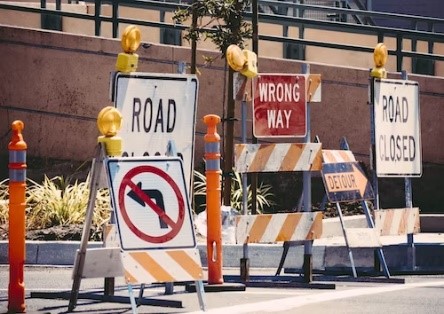
Covenantal Partnerships
by Rev. Racquel Ray
Associate Minister of Congregational Life
Change is hard. For many of us, routines and regular habits are so ingrained in our daily lives that we tend to get comfortable in our ways. We may wake up at the same time every day or go grocery shopping on the same day each week. We go to church on Sunday morning and many people sit in the same pew every time. We walk the dog around the neighborhood on the same route. We drive to our destinations using the same paths we ‘always take’.
What happens when the ‘usual’ is disrupted? When change occurs, we feel anxious and sometimes stressed. We’ve all heard jokes about someone new at church sitting in ‘so and so’s pew’. We are thrown off when road construction detours our usual route. We tend to get uncomfortable with new things and changes.
On Sunday, our congregation will be voting on a new organizational structure for Barrington Congregational Church, United Church of Christ. This is new and it is change. And that may make some of us uncomfortable. I admit I bristled when I saw the proposal and didn’t see a role for the Associate Minister in the first draft! I’m still concerned about the role of Congregational Care and the ministries under that title while so much of my call falls into multiple categories.
And yet, we have so much work to do! If we are truly to live out our call to worship God, embrace all people, minister to one another, work for justice and peace, and render loving service to God’s world we must move through changes.
 Just as we pivoted through the changes of becoming an Open and Affirming Congregation and as we pivoted though the changes of the covid pandemic, we now must pivot through the changes in our organizational structure. How did we do it previously? We talked through our options, we made challenging decisions, and we drew from each other for support through the process. And we will do it now as well!
Just as we pivoted through the changes of becoming an Open and Affirming Congregation and as we pivoted though the changes of the covid pandemic, we now must pivot through the changes in our organizational structure. How did we do it previously? We talked through our options, we made challenging decisions, and we drew from each other for support through the process. And we will do it now as well!
One of the draws of the new structure is ‘inspired ministries’. This opens areas of new ministries – or restoring ones that have fallen away – with more fluidity than the former team-appointed-by-law-structure would permit. We now have the flexibility to try new things! Include new people in our ministries! And engage with our communities in a deeper way.
 One of the initiatives of the Southern New England Conference, UCC is to develop covenantal partners. According to the SNEUCC, “We encourage local congregations and varied ministry settings, inspired and guided by the Holy Spirit, to form covenant partnerships with all who work for the common good in their local communities and throughout the world.” This is the idea behind community chaplaincy and is why I reach out to local schools, government committees, houses of worship, chaplain groups, businesses, senior living facilities, social service agencies, and veterans.
One of the initiatives of the Southern New England Conference, UCC is to develop covenantal partners. According to the SNEUCC, “We encourage local congregations and varied ministry settings, inspired and guided by the Holy Spirit, to form covenant partnerships with all who work for the common good in their local communities and throughout the world.” This is the idea behind community chaplaincy and is why I reach out to local schools, government committees, houses of worship, chaplain groups, businesses, senior living facilities, social service agencies, and veterans.

 If we look at the groups that our congregation connects with, we already have many partnerships. Dale is one of the organizers for the Barrington Day of Caring. I have helped with the Barrington Interfaith Partners and the Diversity, Equity, and Inclusion Team. We partner with Federal Hill House and the Olneyville Food Bank, We Share Hope, Good Neighbors food pantry and soup kitchen, St. Vincent du Paul, Books are Wings, The Women’s Resource Center, TAPIN, and Crossroads Rhode Island.
If we look at the groups that our congregation connects with, we already have many partnerships. Dale is one of the organizers for the Barrington Day of Caring. I have helped with the Barrington Interfaith Partners and the Diversity, Equity, and Inclusion Team. We partner with Federal Hill House and the Olneyville Food Bank, We Share Hope, Good Neighbors food pantry and soup kitchen, St. Vincent du Paul, Books are Wings, The Women’s Resource Center, TAPIN, and Crossroads Rhode Island.
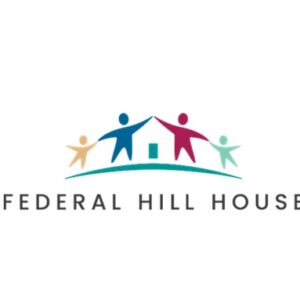 Inspired by the words of church member and Executive Director of Federal Hill House, Kim Fernandez, what would it look like for our congregation to form a deeper relationship with the organizations with which we partner? We donate funds to these organizations several times per year. What would a Covenantal Partnership look like? How could we deepen our connections with our neighboring community? Could we volunteer our time with our partners? Could we invite guest speakers? Could we come up with some creative fundraisers?
Inspired by the words of church member and Executive Director of Federal Hill House, Kim Fernandez, what would it look like for our congregation to form a deeper relationship with the organizations with which we partner? We donate funds to these organizations several times per year. What would a Covenantal Partnership look like? How could we deepen our connections with our neighboring community? Could we volunteer our time with our partners? Could we invite guest speakers? Could we come up with some creative fundraisers?
We have a beautiful church building and campus – including a huge parking lot. Could we host concerts as a fundraiser for a Covenantal Partner? What about our big gathering space and kitchen? Could we share it with a Covenantal Partner for their meetings or events? Could we ask for a tour and go visit our Covenantal Partners and ask them how can we help?
 This week, I met with the Plant Docs https://www.plantdocspvd.com/connect a local nonprofit organization started in 2019 by Sandra Musial, MD, Suyin Lee, MD, and Steve Stein, MD to educate the public and medical professionals about how whole food, plant-based nutrition can prevent, improve, and reverse chronic diseases such as type 2 diabetes, obesity, heart disease, and certain cancers. Dr. Musial has offered to share her expertise with our congregation! She and I would love to partner to offer the Jump Start wellness program to our community in January – perfect time for ‘new year, new you’!
This week, I met with the Plant Docs https://www.plantdocspvd.com/connect a local nonprofit organization started in 2019 by Sandra Musial, MD, Suyin Lee, MD, and Steve Stein, MD to educate the public and medical professionals about how whole food, plant-based nutrition can prevent, improve, and reverse chronic diseases such as type 2 diabetes, obesity, heart disease, and certain cancers. Dr. Musial has offered to share her expertise with our congregation! She and I would love to partner to offer the Jump Start wellness program to our community in January – perfect time for ‘new year, new you’!
Covenantal Partnerships are reciprocal and community building. We are beginning a season of change and possible stress – yes. And, we are also beginning a season of wondering ‘What is next?’ and ‘What is possible?’
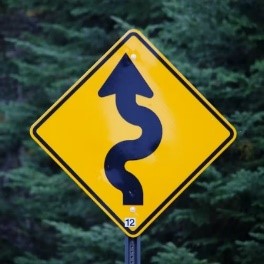 Today, we do not have every answer. But, we have vision, options, and hope. We may not know the direction and the path may be full of turns and pivots. But, whoever you are and wherever you come from you are welcome into the full life and ministry of our church. We’re on the journey together.
Today, we do not have every answer. But, we have vision, options, and hope. We may not know the direction and the path may be full of turns and pivots. But, whoever you are and wherever you come from you are welcome into the full life and ministry of our church. We’re on the journey together.
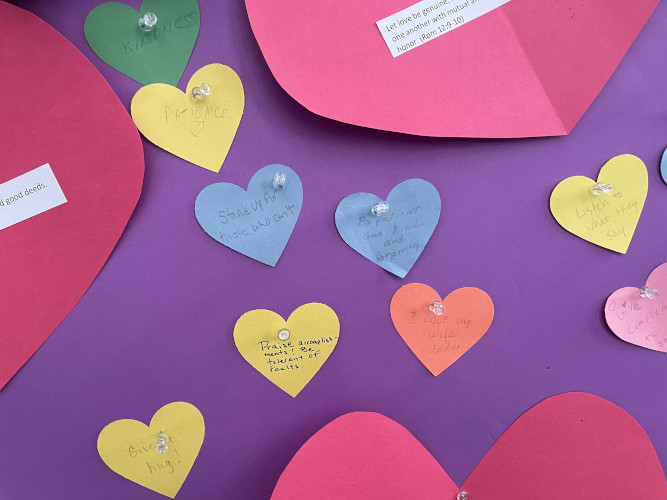
Let’s Get This Party Started!
by Rev. Dr. Dale Azevedo, Sr. Minister
What a great day we had in church last Sunday!
- The Bare Bones Big Band had us swinging in the aisles.
- The children were overflowing the chancel steps.
- The hearts of love were covering the bulletin board.
- New and familiar faces were crowding the pews.
- The hot dogs were overflowing.
- And the preaching was out of this world.
(OK, that last one was just a bit of self-aggrandizement. But the fact still remains: It was a great day!)
Paul writes in his second letter to the church in Corinth that, “If anyone is in Christ, they are a new creation: everything old has passed away; see, everything has become new!”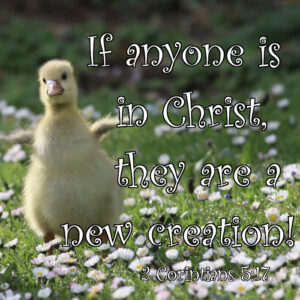
One of the things that was so special about the day is that it was the official start of our church year. It was a new beginning. A fresh start.
That’s where we are right now!
What will happen this year? What will become of BCCUCC over the next twelve months? Will we welcome new members? Will we see new children? Will we celebrate the lives of loved ones newly lost? How will we meet the needs of those hurting in our midst? In our community? Around the world? How will we witness to the love of Christ?
There are just so many opportunities, so many possibilities. Which ones will you take advantage of?
One of the things I’m excited about is working with our new Open and Affirming Team. We have special plans this fall to engage in ministries specifically focused on persons who identify as transgender or gender-queer. This wasn’t even something the church would have imagined when we voted to become “Open and Affirming” in 2010 but has become a major justice issue today.
 And what about exploring a possible new church structure? This has been a process that has been in the works since 2019. Interrupted by the pandemic, this process will propose a new structure for our church that we hope will carry the church forward for the foreseeable future, with a model that is designed to be inclusive and agile, and responsive. If adopted, how will this new structure enhance our understanding and practice of ministry?
And what about exploring a possible new church structure? This has been a process that has been in the works since 2019. Interrupted by the pandemic, this process will propose a new structure for our church that we hope will carry the church forward for the foreseeable future, with a model that is designed to be inclusive and agile, and responsive. If adopted, how will this new structure enhance our understanding and practice of ministry?
And then there’s Bible Study and Church School. Over the past year we’ve developed a wonderful little group of adults who really enjoy exploring the Bible and faith issues and asking deep questions. They’re a fun group. And Andrea has church school rocking. With so many kids each week there are no shortage of activities and classes being offered.
Did I mention fellowship groups? Our bereavement group has been going on for years and is now experiencing more turnout and support than ever. Youth Group was a roaring success last year and promises to bring the energy and excitement into our building again. And Women of Faith has for years come together to discuss contemporary women’s issues and how they live out their faith in their lives.
These are just some of the things I’m excited about following this year.
What about you? What are you excited about for this upcoming year? Is there a ministry of the church you want to support and get behind? Is there something we aren’t doing that you would love to start with a few like-minded folks? Right now, the possibilities are endless. The potential is immense. All it really takes is a passion and a willingness to stand up and say, “Here I am. Send me.”*
behind? Is there something we aren’t doing that you would love to start with a few like-minded folks? Right now, the possibilities are endless. The potential is immense. All it really takes is a passion and a willingness to stand up and say, “Here I am. Send me.”*
*In other words, feel free to talk with Racquel or me about your ministry ideas and we will do all we can to support you in your efforts!
So, let’s get this party started and look forward to whatever it is this year has in store for you and BCCUCC.

Getting ready for a BIG change…
by Rev. Dr. Dale Azevedo, Sr. Minister
Hopefully, most of you know about the significant structural changes likely coming to BCCUCC. I’m not talking about the building structure, but rather the governance/ministry structure. Every organization has a structure in which it operates. BCCUCC is no different. Some structures work better than others. In 2019, we realized ours wasn’t working that well anymore. It served us well for generations with only minor tweaks. Now, like any structure, it needs significant renovations.
Over the past few years I have shared through blogs, annual reports, and elsewhere that we are considering a new structure. Last June, our Governance/Ministry Task Force (GMTF) shared a presentation at the Annual Meeting outlining their work to date. Now, they are beginning to wrap things up and prepare for the next stage of their work. Before they do, however, they are asking for a vote.
On October 1, we are going to hold a special meeting of the Barrington Congregational Church, UCC, to vote on the GMTF’s proposed structure. The GMTF will be asking the congregation to commit to the new structure in theory with the intention of adopting it early 2024. This action will empower the GMTF to work on writing new church by-laws and governance policies as well as begin to recruit the individuals needed to lead our church into the future. The new by-laws and leadership slate are expected to be presented for follow-up votes at our annual budget meeting in January.
Between now and then, the GMTF wants to ensure that you have all the information necessary to make an informed decision on Oct. 1. This is what they have available now and planned for the coming weeks: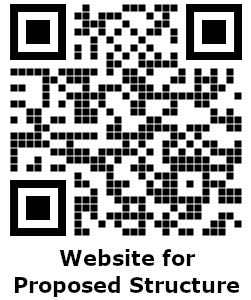
- A video recording of the presentation made at the Annual Meeting in June is currently available on YouTube.
- There is a website dedicated to the new structure. It has the latest information as well as a F.A.Q. for your perusal.
- There will be a series of handouts included in the bulletins throughout September.
- The GMTF will be hosting a Q & A Forum on 9/17 in Fellowship Hall at 11:30 during/following coffee hour.
We truly believe this proposed structure will provide us with the agility, flexibility, inspiration, and accountability that we need to be an active, engaged and vibrant church community.
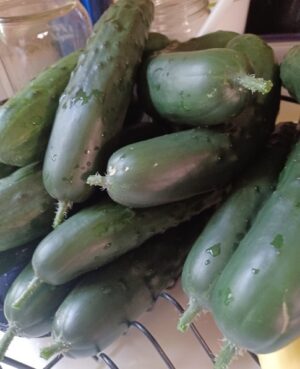
Summer Mindfulness
by Rev. Racquel Ray
Associate Minister of Congregational Life
Jesus taught the disciples, “…do not worry about your life, what you will eat, or what you will drink or about your body, what you will wear…Look at the birds of the air; they neither sow nor reap nor gather into barns, and yet your [God] feeds them…” (Matthew 6:25). He added, you will not add one hour to your life by worrying.
August is always a difficult time for me. On the one hand, I want to be fully present to the beauty of summer. I want to languish for hours in the garden or on the beach. I want to immerse myself in ‘junk reads’ – those juicy fiction books that beckon us to faraway times and places. On the other hand, I am called to get organized. I’m making lists of back-to-school supplies and sorting closets and drawers to make sure the children are ready for the coming weeks, and [this year] repainting my kitchen.
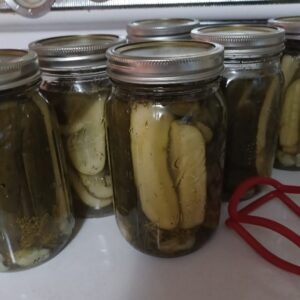 At church, this is the time of year for planning the upcoming program year, selecting curriculum, and adding lesson plans to the calendar. Yesterday, I realized that it’s my turn to return to the Lent in the Labyrinth devotional next spring.
At church, this is the time of year for planning the upcoming program year, selecting curriculum, and adding lesson plans to the calendar. Yesterday, I realized that it’s my turn to return to the Lent in the Labyrinth devotional next spring.
August is not a good time for me to make major financial decisions or commit to more than I can manage. I don’t know where this tendency comes from?! Perhaps, years of planning for the school year as a child? Or, the excitement of returning to college as an adult? Or, decades of sending our own kids to school? Over the years I’ve learned this dynamic about myself and tend to schedule time to be outside. Jesus’ lesson on allowing tomorrow to worry about itself keeps running through my mind and I find myself putting down my pen or paintbrush and going outside.
 There’s something special about the smell of Narragansett Bay, the plants along the East Bay Bike Path, the freshly cut grass on the soccer [field hockey] fields, and the tomatoes and marigold plants in my garden. The sounds of the mid-summer birds flood our yard we endearingly call ‘Ray Farm’. Around the pond, summer bullfrogs bellow through the night while crickets sing us to sleep. Occasionally, a pair of owls will call to each other across our back woods.
There’s something special about the smell of Narragansett Bay, the plants along the East Bay Bike Path, the freshly cut grass on the soccer [field hockey] fields, and the tomatoes and marigold plants in my garden. The sounds of the mid-summer birds flood our yard we endearingly call ‘Ray Farm’. Around the pond, summer bullfrogs bellow through the night while crickets sing us to sleep. Occasionally, a pair of owls will call to each other across our back woods.
 This week, our family observed the ancient mid-summer celebration of Lammas. Lammas or Loaf Mass was another example of a pagan Celtic harvest festival appropriated by the early church as a religious day. Traditionally, the Anglican and Roman churches used the first day of August to celebrate the first wheat harvest of the year hence the term ‘loaf’ mass. The first fruits of the harvest were offered for blessings. Wheat was ground and baked into loaves to be added to the celebration liturgy. At Ray Farm, we are currently harvesting zucchini, tomatoes, cucumbers, blueberries, blackberries, green beans, and herbs. Rather than wheat loaves, I made blueberry shortcake and zucchini pizza boats using up all of this week’s berries, squash, and tomatoes.
This week, our family observed the ancient mid-summer celebration of Lammas. Lammas or Loaf Mass was another example of a pagan Celtic harvest festival appropriated by the early church as a religious day. Traditionally, the Anglican and Roman churches used the first day of August to celebrate the first wheat harvest of the year hence the term ‘loaf’ mass. The first fruits of the harvest were offered for blessings. Wheat was ground and baked into loaves to be added to the celebration liturgy. At Ray Farm, we are currently harvesting zucchini, tomatoes, cucumbers, blueberries, blackberries, green beans, and herbs. Rather than wheat loaves, I made blueberry shortcake and zucchini pizza boats using up all of this week’s berries, squash, and tomatoes.
 I have learned that connecting to the growing cycles have helped me connect with nature and the sacred. When I re-commune with the sacred, I am reminded of Jesus’ words and am able to return to a place of connection; letting go of future to-do lists. When I am immersed in gathering blackberries or canning fresh pickles, I am actually also at church. I am in prayer with praise and thanksgiving for the blessings of stewardship – to tend and to till – this bountiful harvest. In full communion with creation [at least for those moments] I am enjoying summer mindfulness. Occasionally, I may even sing a hymn.
I have learned that connecting to the growing cycles have helped me connect with nature and the sacred. When I re-commune with the sacred, I am reminded of Jesus’ words and am able to return to a place of connection; letting go of future to-do lists. When I am immersed in gathering blackberries or canning fresh pickles, I am actually also at church. I am in prayer with praise and thanksgiving for the blessings of stewardship – to tend and to till – this bountiful harvest. In full communion with creation [at least for those moments] I am enjoying summer mindfulness. Occasionally, I may even sing a hymn.
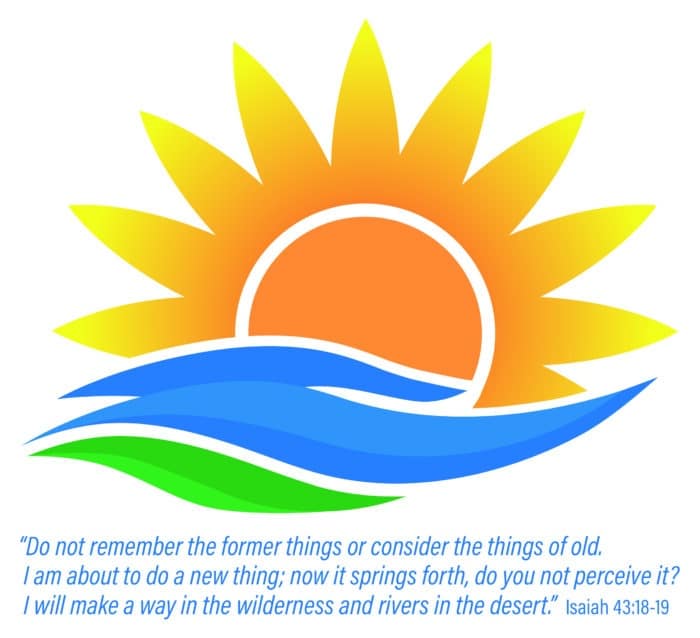
…the Wonderful Synod of IN.
by Rev. Dr. Dale Azevedo, Sr. Minister
Not only did I survive my time at General Synod earlier this month, but I enjoyed myself as well!
If you missed my last blog, General Synod is the biennial national meeting of the United Church of Christ. Or, at least, it was. It is now the triennial meeting. But more on that later. At this meeting we receive reports from the national office on the state of the church and our ministries throughout the world. We also pass a budget, elect officers, and evaluate any resolutions that come before the body. Here are some of the things I would like to share with you as I reflect upon my experience:
Facts
-
- The 34th General Synod of the United Church of Christ met in Indianapolis, IN, from June 30-July 4.
- There were 737 delegates representing local churches from 36 conferences. There were over 2000 attendees if you include special guests and visitors.
- We voted on one bylaw amendment, a new General Minister and President, and 14 Resolutions of Witness.
- My shortest scheduled day was Friday, which ran from 12:30 PM – 9:00 PM.

- My longest day was Monday, which ran from 6:30 AM – 9:30 PM.
- It took me three days to realize there were snacks available during our plenary sessions. This was not helpful. I ate too many fruit snacks and Snickers.
Friendship
One of the highlights of my time at Synod was reconnecting with old, and making new, friends. Many of you may not realize it, but I am an introvert. I REALLY like being alone. After spending each Sunday morning in church, I go home and hibernate. You may be able to imagine, then, what it is like for me to spend 6 days away from home with over 2000 strangers! Fortunately, I was able to carve out time for myself; to be alone or to gather with small groups of colleagues.
While in Indiana, I was able to reconnect with a clergy friend whom I was close with in CT but whom I also lost contact with once I moved to Rhode Island, and she departed our conference staff. About four days in, I found someone who knew her contact information and reached out. We were thrilled to see each other and enjoyed a wonderful lunch at a local restaurant.
I was also able to develop deeper friendships with some of our conference clergy. As one colleague put said to me, “You know, we’ve known each other for years but I don’t think I’ve really ever gotten to know you! This has been great!” And I agreed! We often ate meals together and just found time to hang out. It was wonderful.
Astonishment
Did you ever think your vote didn’t matter? In some cases, that may be mathematically accurate; like when a resolution passes by 600 votes. Did your one  vote make a difference? But what happens when over 700 people vote, and the vote passes by literally ONE vote. That happened. When voting on the bylaw change that impacted the frequency of General Synod meetings, the motion needed a two thirds majority to pass. This is always the case with bylaw changes at the national setting. When the votes were tallied, the change was carried by one vote. I don’t think I have ever seen anything like that in my 30 years of ministry! And, yes, there were hard feelings.
vote make a difference? But what happens when over 700 people vote, and the vote passes by literally ONE vote. That happened. When voting on the bylaw change that impacted the frequency of General Synod meetings, the motion needed a two thirds majority to pass. This is always the case with bylaw changes at the national setting. When the votes were tallied, the change was carried by one vote. I don’t think I have ever seen anything like that in my 30 years of ministry! And, yes, there were hard feelings.
Resolutions
As I mentioned above, there were 14 resolutions of witness. These are resolutions that signify the Synod is standing in support of a particular point of view on an issue. I don’t have room to discuss all these resolutions, but you can find them all here. However, below are some interesting highlights I want to mention:
Gun violence prevention
One of our resolutions was voicing our support for Guns to Gardens and other examples of gun violence prevention. During the debate, an older man with white hair and beard came to the microphone. I believe he introduced himself as from the Midwest and happened to be wearing all red (maybe a coincidence?). In summary, he testified saying something like, “I am a veteran. I own guns. I own a number of guns. My wife also owns guns. There is nothing more that we enjoy than going to the range and shooting. I’m a strong supporter of the Second Amendment. Yet, this resolution is an example of reasonable gun legislation that I can wholeheartedly believe in. I urge you to support this resolution!” I share these words because they brought me hope. We can be so polarized on so many issues. Guns are one of them. Yet this resolution and this man’s words told me there can be common ground. I’d like to see people today find more common ground on more issues.
Plant-based Life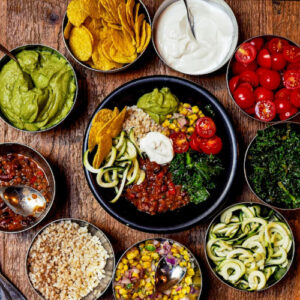
This was, I believe, the only resolution that didn’t pass at Synod. It was also a fascinating experience to listen to the debate and realize the issues presented go much deeper than I thought or realized. One piece of advice we received before flying to Indianapolis was to not prejudge any motion as we may be surprised by the insights presented by other members of our denomination. We are often inclined to evaluate a motion or resolution through our own lens and can learn a lot from those who come from another perspective.
The first thing to acknowledge is that the subcommittee in charge of previewing this resolution made extensive rewrites before sending it to the floor for a vote. The motion we voted on was about 90% different than what was first presented. Changes to this extent are unusual, and in this case, was a factor in the motion being defeated. The amended resolution was much more rigorous and made specific recommendations to local churches (and other levels of the denomination) of policies they should adopt or actions they should take. The more specific resolutions become, the harder it is for them to pass.
Additionally, as I mentioned above, the debate provided some interesting insights into why people would be opposed to this resolution. Arguments against the resolution came in three varieties: financial, economic, and cultural.
-
-
- The financial concerns were the ones raised by local churches. People shared that their local church did not have the finances to provide both meat-based and plant-based (salads were condemned as “not good enough” as an option) options at every event.
- Economic concerns were raised by those who represented meat producing communities. These folk lamented meat-packing plants and whole mass-market meat industry, but said their communities consisted of small farmers who relied on people eating meat. These farmers would cease to be profitable, and their churches would close, if they were lumped together with the meat-packing industry (as was the case in the revised resolution).
- Finally, several people criticized the resolution on cultural grounds. They argued that while the resolution was well meaning, it lacked cultural understanding and nuance. The resolution was considered colonialist and dismissive of the eating norms of minority cultures.
-
 As you can see, what may seem a simple resolution supporting a vegetarian diet and condemning the exploitation of animals was far more complex for a great many of the delegates at Synod. Fascinating!
As you can see, what may seem a simple resolution supporting a vegetarian diet and condemning the exploitation of animals was far more complex for a great many of the delegates at Synod. Fascinating!
Digital Divide
This was the resolution for my sub-committee. It was a resolution lamenting the growing divide between those with access to, and the ability to use, highspeed quality internet and those without. It is a reality in our community, our state, our country, and around the world. Access to technology is creating greater advantages and disadvantages for people of all ages to overcome. The resolution passed our committee and the general plenary easily. However, I bring it up because it was such a weird and frustrating experience. My subcommittee spent a significant amount of time wordsmithing this resolution and debating things like punctuation and grammar. In the end, we spent three hours and forty-five minutes discussing this resolution only to make no changes and pass it unanimously. I honestly thought some people just had nothing better to do than discuss periods and commas for no purpose. Gosh, I love the church!
Hilarity
One example of hilarity (if I wasn’t so frustrated) is the example above. Another example was the next day, when we spent 30 minutes debating a resolution on the floor only to finally vote and find out the vote was over 700 in favor and three opposed. Only three opposed! And yet, we discussed it for half an hour. Oh, and no one raised any objections during that debate. It was just one person after another getting up and agreeing with the previous person. SMH. As I said above, I love the church!
So that’s about it! Synod was a great experience and, although it was more work, I enjoyed being a delegate over a visitor. I was more engaged and invested. However, these are only my reactions. Everyone’s experience is different. If you want to hear more about what happened at Synod or would enjoy hearing some other peoples’ takes the conference published blogs throughout the event that are still available on the conference website.
And, if you want to know more, feel free to reach out to me. Have a great day!

I’m off to see the Synod…
by Rev. Dr. Dale Azevedo, Sr. Minister
Tomorrow, Thursday, I leave for General Synod 2023.
What is General Synod, you ask?
Unofficially, General Synod is the national gathering of the United Church of Christ (UCC), our parent denomination. It brings together lay and clergy delegates representing all conferences from around the country to discuss issues and make decisions on the present state of the world and the future of our denomination.
Officially, General Synod is a biennial gathering of representatives of conferences chosen from local churches of the United Church of Christ. Resolutions and pronouncements are brought for consideration to General Synod by groups and members of the church. When passed, resolutions and pronouncements become the witness of the General Synod and are commended to all members of the United Church of Christ for consideration. 1
This year there will be roughly 700 delegates representing all 36 regional conferences. Of those 700 delegates, 99 of them will be from the Southern New England Conference (SNEUCC), our conference, and four of those are from the Rhode Island Association, our association.
This General Synod has a few key highlights to mention.
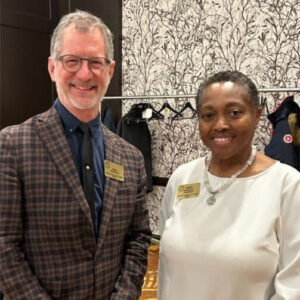 First, we will be electing our next General Minister & President. The Office of the General Minister & President is responsible for administration and common services for the National Setting. The Office of the General Minister & President oversees the finance office, human resources, legal counsel, and strategy and planning, in addition to philanthropy, research, technology, marketing. and communications.2 The nominee for next General Minister and President is Dr. Karen Georgia Thompson, who presently serves in the national setting as Associate General Minister for Wider Church Ministries and Co-Executive for Global Ministries and has previously served ministries in Florida and New York.
First, we will be electing our next General Minister & President. The Office of the General Minister & President is responsible for administration and common services for the National Setting. The Office of the General Minister & President oversees the finance office, human resources, legal counsel, and strategy and planning, in addition to philanthropy, research, technology, marketing. and communications.2 The nominee for next General Minister and President is Dr. Karen Georgia Thompson, who presently serves in the national setting as Associate General Minister for Wider Church Ministries and Co-Executive for Global Ministries and has previously served ministries in Florida and New York.
- Another highlight is a potential change to the UCC by-laws shifting General Synod from a biennial to triennial event. Since the UCC’s inception in 1957, General Synod has met every other year. The proposed change to meet every third year is recommended in an effort to address two main concerns: the overwhelming time commitment required of our national staff to plan, organize, implement, and follow through with the event as well as the increasing cost that the gathering passes
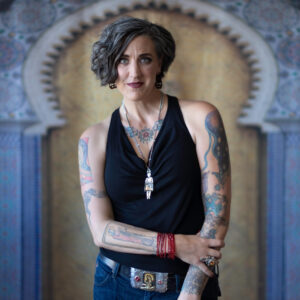 along to our area conferences and associations. The hope is that by meeting every three years it will increase administrative efficiency while reducing costs.
along to our area conferences and associations. The hope is that by meeting every three years it will increase administrative efficiency while reducing costs.
- The final highlight for Synod 2023 is the presence of Nadia Bolz-Weber as the event’s keynote speaker. Rev. Bolz-Weber is well known as one of the most influential and innovative pastors and theologians in the modern generation. She is an ordained Lutheran and the founding pastor of House for All Sinners and Saints.
General Synod is also filled with numerous other tasks and opportunities.
- Worship is always a key component of any regional or national gathering of the church. It is powerful to gather along with 700-1000 people who are all intentionally engaged praying, learning, and singing together. There is a reason many people flock to megachurches. There is something Compelling about being a part of a large group unified to one purpose. And when praising and serving God is that one purpose, all the better.
- Next to worship, discussing and voting on resolutions is probably the next most important order of business, and takes up the majority of our time. This year we will be discussing 15 different resolutions covering topics from abortion as healthcare to discrimination of native peoples to encouraging a plant-based life. I have been appointed to the committee that will be discussing and moving on a resolution entitled Closing the Digital Divide: Calling on the United Church of Christ to Seek Digital Justice and Inclusion.
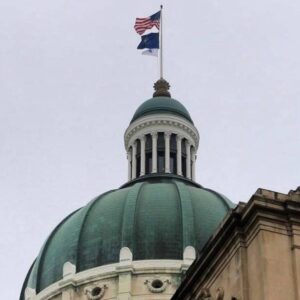 And what is a UCC gathering without service and social witness? Our Synod service project this year is building Period Packs. Although it rarely garners public notice (perhaps for sexist or cultural reasons) lack of access to menstrual hygiene is a major issue within many populations around the world and even in our own communities. We will be working with Church World Service to prepare and distribute these kits. Additionally, we will be holding a Prayer Walk and Vigil at the Indiana Statehouse. The vigil will include music and brief remarks led by UCC leadership as well as representatives from the Indiana-Kentucky Conference, including two UCC Indiana State legislators.3
And what is a UCC gathering without service and social witness? Our Synod service project this year is building Period Packs. Although it rarely garners public notice (perhaps for sexist or cultural reasons) lack of access to menstrual hygiene is a major issue within many populations around the world and even in our own communities. We will be working with Church World Service to prepare and distribute these kits. Additionally, we will be holding a Prayer Walk and Vigil at the Indiana Statehouse. The vigil will include music and brief remarks led by UCC leadership as well as representatives from the Indiana-Kentucky Conference, including two UCC Indiana State legislators.3
All in all, General Synod will prove to be an exciting, inspirational, exhausting, boring, and powerful week for me. I will return to the office on Thursday, July 6, and look forward to worshiping together the following Sunday. I will also follow up this blog with my post-Synod reactions the week after I return. In the meantime, please hold me and all those attending in your prayers as we do this important work and witness.
May God’s blessing be with you, and us.
- https://www.ucc.org/who-we-are/about/general-synod/inclusive-language-general-synod/#:~:text=General%20Synod%20is%20a%20biennial,and%20members%20of%20the%20church.
- https://www.ucc.org/what-we-do/office-of-the-general-minister-president/
- https://generalsynod.org/prayer-walk-and-vigil
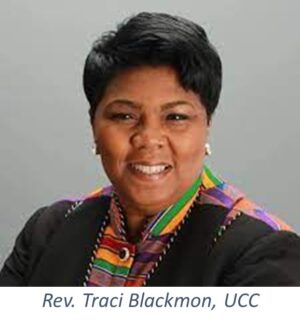
Women of the Bible and Ministry
by Rev. Racquel Ray
Associate Minister of Congregational Life
Have you ever wondered why ‘women in ministry’ is such a divisive issue among Christians? Have you questioned why certain denominations exclude women from serving as clergy? Have you thought about why so many biblical women are depicted as prostitutes? Have you been enthralled by stories or sermons about Mary or Elizabeth? Have you ever gotten confused over the ‘Marys’? How many are there, anyway?! Have you wondered what the ‘Children of Hagar’ means? Why is Eve blamed for the Fall of Man? Why are so many women unnamed in the bible? Have you been outraged by Christian division based in gender bias?
At a recent BCCUCC Deacons meeting, Rev. Dale offered a reflection on women of the bible sharing an article from Woman’s Day magazine. (SULLIVAN, 2022). The article, 20 Amazing Women in the Bible to Learn From and Admire, gave a brief paragraph about twenty biblical females. Each Deacon was asked to read the stories and choose a biblical woman whose story stood out to them. The group was asked to share their choice and why they chose that character.
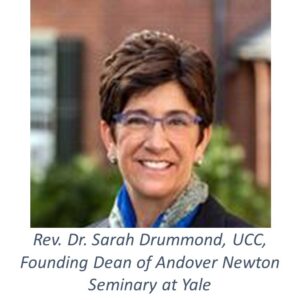 It is clear to me, as it was to our Deacons, that each of us has a favorite female biblical story. Our favorites come from fond childhood memories of stories from church school, confirmation, or worship. Many have fond memories of Mary, the mother of Jesus, from either the Nativity story of Christmas or from an upbringing in another denomination that venerates St. Mary, the Blessed Virgin. Many of us can identify with the story of Lazarus’ sisters, Jesus’ friends, Mary and Martha. Some will identify as, “I’m a Martha” who tend to be busy at church rather than quiet and contemplatively studying Jesus’ words as a ‘Mary’ would. Many of us admire the courage of Miriam or the faith of Elizabeth, or the fierceness of Deborah. And, someone asked the question, “Were there ever any female pastors/priests in the bible?”
It is clear to me, as it was to our Deacons, that each of us has a favorite female biblical story. Our favorites come from fond childhood memories of stories from church school, confirmation, or worship. Many have fond memories of Mary, the mother of Jesus, from either the Nativity story of Christmas or from an upbringing in another denomination that venerates St. Mary, the Blessed Virgin. Many of us can identify with the story of Lazarus’ sisters, Jesus’ friends, Mary and Martha. Some will identify as, “I’m a Martha” who tend to be busy at church rather than quiet and contemplatively studying Jesus’ words as a ‘Mary’ would. Many of us admire the courage of Miriam or the faith of Elizabeth, or the fierceness of Deborah. And, someone asked the question, “Were there ever any female pastors/priests in the bible?”
The answer is YES. There were female elders in the early church and throughout the biblical narrative of God’s people. There have been and continue to be female leaders in churches since. And there will still be female leaders in the church to be revealed in the future.
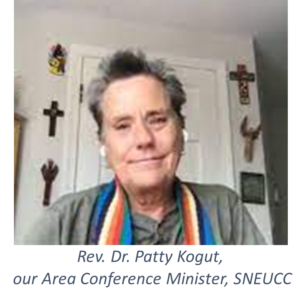 So, why are recent news reports highlighting the Southern Baptist Convention and their bias to exclude females from the role and title of Pastor? And why would the SBC exclude any church that has female leadership from their membership? And, why would they chose to exclude a church with over 20,000 members, Saddleback Church in Lake Forest, California? The denomination argues that women in pastoral roles is not biblical. And, although they had been ordaining women since 1964, they stopped doing so relatively recently in 2000 (Wikipedia, 2023). When my 8-year-old heard the news report, she said, “What about Mary?”
So, why are recent news reports highlighting the Southern Baptist Convention and their bias to exclude females from the role and title of Pastor? And why would the SBC exclude any church that has female leadership from their membership? And, why would they chose to exclude a church with over 20,000 members, Saddleback Church in Lake Forest, California? The denomination argues that women in pastoral roles is not biblical. And, although they had been ordaining women since 1964, they stopped doing so relatively recently in 2000 (Wikipedia, 2023). When my 8-year-old heard the news report, she said, “What about Mary?”
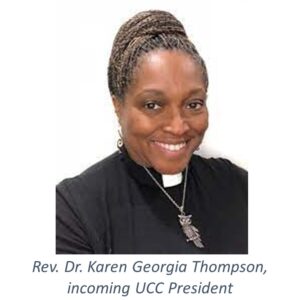 Beloved, if an 8-year-old can understand this so should we. The biblical her-story is clear. From Eve to Mary, to Martha and Mary, and to the female disciples at the cross, the tomb, and into the ministry of the early church including the Acts of the Apostles, women are equal participants in the ministry. The early church saw profound mysticism and writings from St. Teresa of Avila, Julian of Norwich, and Hildegard de Bingen. Modern leaders have been seen in St. Teresa of Calcutta, Dorothy Day, Sarah Coakley, Evelyn Underhill, Barbara Brown Taylor, and Karen Armstrong. And we currently have amazingly strong female leadership in many Christian denominations including Rev. Nadia Bolz-Weber, Rev. Traci Blackmon, Rev. Dr. Velda Love, our Area Conference Minister Rev. Dr. Patty Kogut, Rev. Dr. Sarah Drummond, Founding Dean of Andover Newton Seminary at Yale, and the incoming UCC President Rev. Dr. Karen Georgia A. Thompson. Rhode Island is home to dozens of very gifted women in pastoral and chaplaincy ministries. I’m sure you can add to this brief list!
Beloved, if an 8-year-old can understand this so should we. The biblical her-story is clear. From Eve to Mary, to Martha and Mary, and to the female disciples at the cross, the tomb, and into the ministry of the early church including the Acts of the Apostles, women are equal participants in the ministry. The early church saw profound mysticism and writings from St. Teresa of Avila, Julian of Norwich, and Hildegard de Bingen. Modern leaders have been seen in St. Teresa of Calcutta, Dorothy Day, Sarah Coakley, Evelyn Underhill, Barbara Brown Taylor, and Karen Armstrong. And we currently have amazingly strong female leadership in many Christian denominations including Rev. Nadia Bolz-Weber, Rev. Traci Blackmon, Rev. Dr. Velda Love, our Area Conference Minister Rev. Dr. Patty Kogut, Rev. Dr. Sarah Drummond, Founding Dean of Andover Newton Seminary at Yale, and the incoming UCC President Rev. Dr. Karen Georgia A. Thompson. Rhode Island is home to dozens of very gifted women in pastoral and chaplaincy ministries. I’m sure you can add to this brief list!
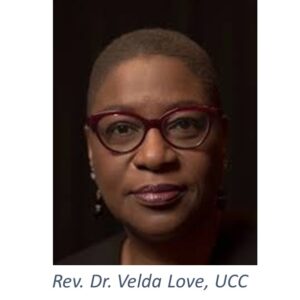 The Congregational Church which has merged into the United Church of Christ first Ordained women beginning with Antoinette Brown Blackwell in 1853. The Church of England Ordained women in March 1994. The Episcopal church began ordaining women in 1975. In 1970 the Lutheran Church began ordaining women. The Presbyterian church began female ordinations in 1956. A list of the timeline can be found on Wikipedia https://en.wikipedia.org/wiki/Timeline_of_women%27s_ordination
The Congregational Church which has merged into the United Church of Christ first Ordained women beginning with Antoinette Brown Blackwell in 1853. The Church of England Ordained women in March 1994. The Episcopal church began ordaining women in 1975. In 1970 the Lutheran Church began ordaining women. The Presbyterian church began female ordinations in 1956. A list of the timeline can be found on Wikipedia https://en.wikipedia.org/wiki/Timeline_of_women%27s_ordination
Women have been in pastoral ministry throughout history/her-story. So, why is there so much controversy surrounding the question of women in ministry? Is there a reason why women are excluded? Is there an untold story?
Join Rev. Dale and Rev. Racquel as we tell the stories of 11 female leaders through the Women of the Bible Preaching Series this summer.
July 2 Eve – Racquel
July 9 Sarah and Hagar – Dale
July 16 Jochebed and Miriam – Dale
July 23 Deborah – Racquel
July 30 Ruth – Dale
Aug 6 Hannah – Racquel
Aug 13 Esther – Racquel
Aug 20 Mary and Martha – Dale
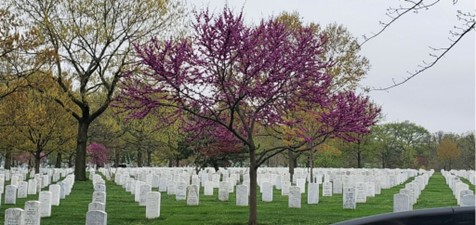
In Memoriam
by Rev. Racquel Ray
Assoc. Minister of Congregational Life
I am not a pacifist. Try as I might to change myself through prayer, worship, contemplation, study, and reflection, I still believe in the value of confrontation and defense when needed. I am not one to ‘turn the other cheek’. I am more of a New England sports fan in the ‘mess around and find out category’. That is to say, I won’t seek out conflict but, if conflict finds me or a loved one or a congregation member or a community member I will engage in the defense of the vulnerable. Every time.
 As a nation, we will observe Memorial Day this weekend. Memorial Day is a day of honor and remembrance for those who died in service to this country and those who are counted as Missing in Action. Veterans Day is in honor of those who have served in Military service. Armed Forces Day is for those who are still serving in uniform. Memorial Day is also a time to remember and honor those Veterans who have died in the past year.
As a nation, we will observe Memorial Day this weekend. Memorial Day is a day of honor and remembrance for those who died in service to this country and those who are counted as Missing in Action. Veterans Day is in honor of those who have served in Military service. Armed Forces Day is for those who are still serving in uniform. Memorial Day is also a time to remember and honor those Veterans who have died in the past year.
Yesterday, I attended the Veterans Administration’s annual Memorial Service at the VA Hospital Chapel. I was reminded of the sacrifices of our local Veteran population and their loved ones and caregivers. I attended to remember George Bolton. Chaplain Rev. Rotunda East read the Roll Call of the deceased, including George. Attendees were invited to come forward as the names were read, light a candle in remembrance, and receive a carnation. I received three carnations. One was for Rose Marie, one was for a friend, and one was for me in memory of my family military service members who have died.
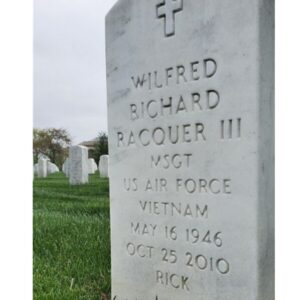 I have several loved ones interred in National Cemeteries across this country. My father-in-law is in Riverside, CA. My father is in Arlington National Cemetery. My grandparents are in Exeter. I have ten family member Veterans in the last two generations and each generation before has at least one.
I have several loved ones interred in National Cemeteries across this country. My father-in-law is in Riverside, CA. My father is in Arlington National Cemetery. My grandparents are in Exeter. I have ten family member Veterans in the last two generations and each generation before has at least one.
When Chaplain East read the Roll Call, she reminded the congregation that the tradition of the Roll Call goes back hundreds of years. At each military formation the names of those present are read and each member responds ‘present’ or ‘here’. When Roll Call is read on the battlefield, there is silence following the names of those lost in battle. The silence for the deceased is profoundly visceral; sad, somber, sobering, and memorializing. And, as TAPS is played and the memorial flag is folded and presented in a military funeral, that feeling is re-lived in my body, mind, and spirit each time.
War is hell. There is no question that we would all rather have peace. And many of us in the Christian context have spent our lives trying to attain and maintain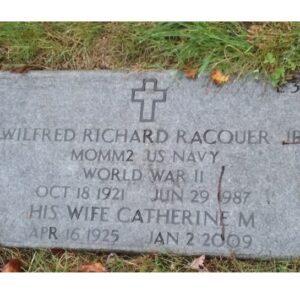 peace. And the fact is that war, violence, and conflict remain.
peace. And the fact is that war, violence, and conflict remain.
There are those among us who truly are pacifists. Some can truly follow Jesus’s mandate from Matthew 5:38-40, “You have heard that it was said, ‘Eye for eye, and tooth for tooth.’ But I tell you, do not resist an evil person. If anyone slaps you on the right cheek, turn to them the other cheek also. And if anyone wants to sue you and take your shirt, hand over your coat as well.” I admire this greatly.
However, I believe in the Thomistic ‘Just War’ morality, and that Christian service calls us to defend the vulnerable. Jesus also calls us to altruistic service. The praxis of altruism is seen in Jesus’ sacrifice on the cross. John 3:16 is often quoted to illustrate the argument for God’s love. And Matthew 20:8 informs us that Jesus “did not come to be served, but to serve, and to give His life a ransom for many”. I am often reminded on Memorial Day and Veteran’s Day of John 15:13 “Greater love has no one than this, than to lay down one’s life for one’s friends.” A true altruist will also do the same for their enemies.
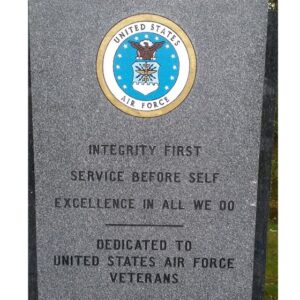 Volumes have been written about war and peace. The balance between the two is global and timeless. And that is not an issue I will solve in my lifetime. I can only say that for me, in my Spirit, the Christian mandate to serve even to the point of sacrifice informs my call.
Volumes have been written about war and peace. The balance between the two is global and timeless. And that is not an issue I will solve in my lifetime. I can only say that for me, in my Spirit, the Christian mandate to serve even to the point of sacrifice informs my call.
This Memorial Day, remember those who have died in service to this country. Remember the loved ones who are still with us. Remember the Veterans among us who witnessed the hell of war, losing friends, innocence, and peace. And remember that as long as this world still has conflict some of us will be in harm’s way in response to our call to serve, support, and defend the most vulnerable among us. As 1 John 3:16 states, “By this we know love, because He laid down His life for us. And we also ought to lay down our lives for the brethren”.
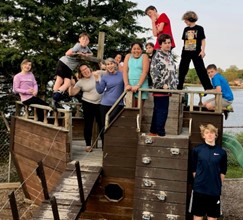
Youth Group is Great!
by Rev. Racquel Ray
Assoc. Minister of Congregational Life
In October of 2021, I wrote my first blog for Barrington Congregational Church, UCC on the importance of the presence of children within our congregation. That blog began with, “Children’s presence in the community has been acknowledged from Jesus to today. However, at times, the church failed to recognize the importance and contributions of children in its mission. Here at Barrington Congregational Church United Church of Christ, our young folks are integral members of the community. This is in keeping with the Gospel message.” Today, that reality is alive and thriving at our church.
This week’s Youth Group gathering was SO FUN and SO HOLY and SACRED that the joy expressed on Monday night bubbled over into conversations at a Tuesday early morning rowing group, our staff meeting, and church office conversations. The joy from Monday night is still felt throughout the community conversations all the way to today – Thursday! And, I wanted to tell you all about it!
Youth Group meets every Monday night with few exceptions during the church program year which follows the school calendar. When there is no school, there is no Youth Group. We also scheduled a few weeks away around holidays and school breaks to better support kids and their families as they transition back from those vacations. This year we have 28 gatherings.
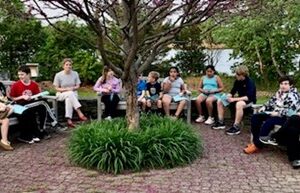 When I wrote that first blog 18 months ago, we did not have an active Youth Group. Now, we have 17 young people who have cycled in and out, around and through our group. There are usually a dozen or so with us on Monday nights and they have the flexibility to come and go as needed to support theatre rehearsal, cotillion classes, soccer practice, homework, and family schedules. We meet for ONE hour, serve a simple dinner – usually pizza, and we close with a circle of prayer each week.
When I wrote that first blog 18 months ago, we did not have an active Youth Group. Now, we have 17 young people who have cycled in and out, around and through our group. There are usually a dozen or so with us on Monday nights and they have the flexibility to come and go as needed to support theatre rehearsal, cotillion classes, soccer practice, homework, and family schedules. We meet for ONE hour, serve a simple dinner – usually pizza, and we close with a circle of prayer each week.
You may have heard me say that this is an energetic group! They range in ages, gender identities, abilities, and families. As a whole, they can speak several languages, solve the rubics cube in under two minutes, and speed read. There are artists, athletes, actors, and academics in the group. Those with photographic memories and some with audiographic memories. They are neurodiverse and creative. They have older siblings, younger siblings, friends, and families that they bring with them – OFTEN.
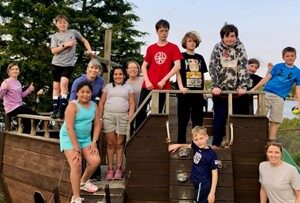 Our Youth have been inviting each other to church, inviting their friends to church, inviting their relatives to church, and making sure their parents bring them on Sundays and Mondays. They text each other to see who is coming to church! And some of them share the same classrooms at school – where they now have church peers to count on when they need support.
Our Youth have been inviting each other to church, inviting their friends to church, inviting their relatives to church, and making sure their parents bring them on Sundays and Mondays. They text each other to see who is coming to church! And some of them share the same classrooms at school – where they now have church peers to count on when they need support.
The Youth Group parents and chaperones have built a community of support around this ministry! They carpool to bring several families’ kids at once. They help clean up. They visit with one another and bring younger siblings – who beg to participate. We now have a ‘Jr. Youth Group’ with several younger siblings joining regularly.
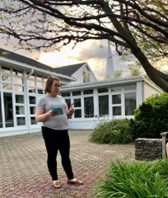 We’ve exhausted our pizza budget! We ran out of crafts! We use all the leftovers from coffee hour, holiday candy, and church events. We play on the playground, play basketball in Fellowship Hall, we use the stage, we use the kitchen, and we run up and down the halls playing various games throughout our meetings. We fill the building with noise, energy and life! I, personally, get in over 6,000 steps on my fitness device in the one hour!
We’ve exhausted our pizza budget! We ran out of crafts! We use all the leftovers from coffee hour, holiday candy, and church events. We play on the playground, play basketball in Fellowship Hall, we use the stage, we use the kitchen, and we run up and down the halls playing various games throughout our meetings. We fill the building with noise, energy and life! I, personally, get in over 6,000 steps on my fitness device in the one hour!
You may have heard me say, “Children are woven into the fabric of our communities whether neighborhoods, schools or churches. As promised through the Baptismal Covenant the church has received children into the body of Christ. Children are not the future of the church. They are the NOW of the church; full and present members of the Body of Christ.”
There is a formula to church growth, to building the Body of Christ, to loving our neighbors. I believe, one part of that success formula is to nurture children, Youth, and families. As these young people grow up, they will be the confirmation candidates, the graduates, and eventually…way down the road, the newlyweds, new parents, and baptismal parents.
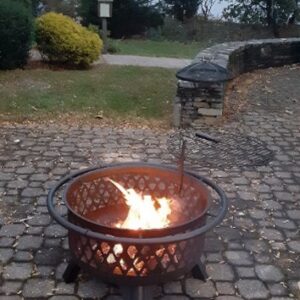 This work is HOLY and SACRED, and it’s messy! Loud! It is kinetic and creative. And, church, I’ve got to tell you – it is AMAZING! The church has a unique obligation to children; to acknowledge, accept and accompany young people (and their parents). And that is visible on Monday nights. And this is the work of the Gospel; finding creative, relevant, and impactful ways to centralize our youngest members.
This work is HOLY and SACRED, and it’s messy! Loud! It is kinetic and creative. And, church, I’ve got to tell you – it is AMAZING! The church has a unique obligation to children; to acknowledge, accept and accompany young people (and their parents). And that is visible on Monday nights. And this is the work of the Gospel; finding creative, relevant, and impactful ways to centralize our youngest members.
As our program year closes in a few weeks I would like to commend our FFAYM programs to your attention. As our children and youth are vital to our community, we need your support in our Church School and Youth Ministry efforts. Jubilation Sunday on May 21 will celebrate all of these efforts: Church School and all of its teachers, adult chaperones for weekly Youth Group meetings, O.W.L. facilitators, Confirmation Mentors, and the Sing and Celebrate Children’s Choir. Please prayerfully consider whether God is nudging you to help out? Your ministry on behalf of our younger members will be a great gift to our church! Registrations for next year – including adult volunteers – will begin on Jubilation Sunday!

How I Spent My Birthday: a Synod Preview
by Rev. Dr. Dale Azevedo, Sr. Minister
I have to admit it. I was salty. Last Saturday was my birthday and I was required to spend all day at a church training in Connecticut.
You see, I’m a delegate for General Synod.
General Synod is the bi-annual denomination-wide meeting of the United Church of Christ. Every two years clergy and laity from across the country gather to worship, celebrate, and conduct the “business of the church”. This year’s Synod will be held in Indianapolis, IN, from June 30 – July 4. And, yes, I was elected as a delegate attending on behalf of the Rhode Island Association of the Southern New England Conference of the United Church of Christ.
And our training was scheduled for all day on Saturday, April 22.
Shortly after I registered for the training it was announced that those who could not make the training were invited to an online version that would take place at a later date and consist of a two hour Zoom presentation. Why was I spending 6 hours in training while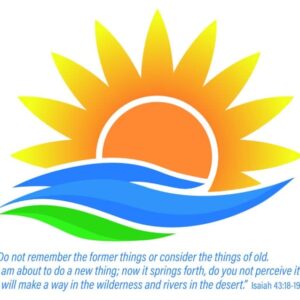 driving over an hour each way ON MY BIRTHDAY when I could easily have chosen the quick and comfortable two hour training from my Lay-Z-Boy? As the day approached I became crankier and crankier about how I was going to spend my “special day.” This was exacerbated by the fact that I had convinced myself that no one in their right mind would sacrifice an entire day by choice and I would be only one of a handful of fools to attend in person. This undermined my primary reason for going, which was getting to know the other delegates from our region.
driving over an hour each way ON MY BIRTHDAY when I could easily have chosen the quick and comfortable two hour training from my Lay-Z-Boy? As the day approached I became crankier and crankier about how I was going to spend my “special day.” This was exacerbated by the fact that I had convinced myself that no one in their right mind would sacrifice an entire day by choice and I would be only one of a handful of fools to attend in person. This undermined my primary reason for going, which was getting to know the other delegates from our region.
So, yes, I was salty.
I was also wrong.
Saturday morning I got up early, put on my big-boy pants, and headed out to Connecticut. When I arrived, I was greeted by a room full of people, roughly 72 to be more accurate. 72 of our 99 delegates were committed enough to take a day out of their lives to attend a training in support of their church and its denomination. The training was also very fruitful. Worship was uplifting and meaningful. Presentations were relevant. And I got to reconnect with old friends and make new ones. Rarely am I ever so happy to be wrong.
 As we get closer to General Synod, I will share more details about the expectations I hold, and after, the experiences I have. General Synod is a big deal. This year we will be discussing 15 different resolutions covering topics from abortion as healthcare to discrimination of native peoples to encouraging a plant-based life. We will also be electing a new General Minister and modifying our by-laws. I have previously attended Synod in 2015 (Cleveland) and 2017 (Baltimore), both times as a visitor. It is a pretty awesome (and at times, boring) experience. It truly helps us to recognize the great differences and similarities we share as a denomination. Worship is often top-notch and the keynote speakers are national names that provoke deep thoughts about the role and nature of the church.
As we get closer to General Synod, I will share more details about the expectations I hold, and after, the experiences I have. General Synod is a big deal. This year we will be discussing 15 different resolutions covering topics from abortion as healthcare to discrimination of native peoples to encouraging a plant-based life. We will also be electing a new General Minister and modifying our by-laws. I have previously attended Synod in 2015 (Cleveland) and 2017 (Baltimore), both times as a visitor. It is a pretty awesome (and at times, boring) experience. It truly helps us to recognize the great differences and similarities we share as a denomination. Worship is often top-notch and the keynote speakers are national names that provoke deep thoughts about the role and nature of the church.
Prior to last Saturday, I was not only regretting my decision to attend the training, but I was also regretting my decision to be a delegate. I was thinking about how difficult it would be to be away from BCCUCC another week and to be away from my family. And for what? To sit in a giant convention center for 12 hours a day listening to reports and contentious debate? No thank you! But attending the training last weekend reawakened by respect for the process and my appreciation for the ~1200 people who will be attending Synod along with me. I now look forward to attending AND to sharing my experiences with you.
 Lastly, you may not know this but the SNEUCC is looking for young people to attend Synod as a part of our Youth at Synod delegation. This is an opportunity for 13 to 18 year old UCC youth to join a special youth contingent who will travel together from southern New England to Indianapolis to attend many of the proceedings at the event as well as participate in other wonderful opportunities. Scholarships are available if any of our youth are interested. And while you may not be able to hang out with me the whole week, I promise we’ll cross paths at least a few times and, if I’m allowed, I’ll take you out to dinner while we’re there! Let me know if you are interested!!
Lastly, you may not know this but the SNEUCC is looking for young people to attend Synod as a part of our Youth at Synod delegation. This is an opportunity for 13 to 18 year old UCC youth to join a special youth contingent who will travel together from southern New England to Indianapolis to attend many of the proceedings at the event as well as participate in other wonderful opportunities. Scholarships are available if any of our youth are interested. And while you may not be able to hang out with me the whole week, I promise we’ll cross paths at least a few times and, if I’m allowed, I’ll take you out to dinner while we’re there! Let me know if you are interested!!
So how did I spend my birthday? I spent it hanging out with 72 of my “closest” friends sitting around discussing church polity. And I enjoyed every minute of it!


